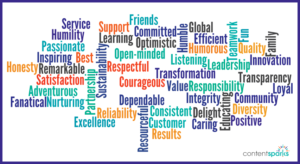By: Sarah Surrey, LCSW, CRAADC

Remember the lofty goals that you had for 2020? The books you were going to read, and career-climbing you were going to do? Remember the massive nutrition overhaul you were going to take on, and the worldwide travelling you were going to complete? 2020! This is the year!
Sure, the pandemic, and all the abrupt change that went with that, completely altered those goals. However, the pandemic wasn’t the problem with those goals in the first place. The problem with goals is usually why we set them, how we set them, and what we expect from them. Stay with me, and set some pandemic-proof goals for 2021.
The goals/value mismatch
The most popular goals have a tendency to match our culture more than ourselves. We work out for a body that meets an outside standard. We read for an intellect that fits our social expectations. We travel, change, and recalibrate to match the culturally acceptable version of ourselves. We forget to check in with our own values first before we set goals. Sometimes it’s hard to consider what we value because we’ve never thought to put it into words. In addiction, substance use drowns out any connection to our values, and makes it impossible to know what’s truly important.
Try answering these questions:
- It important to me to be __________.
- I feel the best about myself when I am _________.
- My relationships are special because _______________.
- The most important part of a friendship is ____________.
- The thing I like least about myself is ____________; but the thing I like the most is ___________.
Check out this image below for some core value words to get you started.
As we move into the next part of goal-setting, the goals you set might sound similar, but reflect a different value now. For example, you might value connection more at this point in your life than physical health. A goal that keeps your value in the center would be to join an online exercise community, or find a running buddy. When your goals line up with your values, you are more likely to keep them going.
How to Set Fail-safe Goals
Is it possible to set goals that you cannot fail? Absolutely! Here’s how to start.
Set an incredibly low bar. That’s right, I said it. If 2020 taught us anything it’s that we need a few wins in our lives. So if you are setting some goals for yourself, after a year that presented unprecedented challenges, make sure those goals are achievable.
The brain craves success. Completing something triggers dopamine, the feel good chemical that motivates us to return to that task again. Picture the last time you set a very ambitious goal that you were unable to complete. Remember that feeling that you had when it didn’t happen for you? I bet it’s tough to even imagine taking on that same goal again, because the brain chemically strives to avoid that feeling.
For some people, a seemingly unachievable goal has to be taken on again. People in active addiction face this challenge. That’s why a strong support system is vital to achieving long term sobriety. For many, it also includes developing self-compassion, and a sense that any time spent in sobriety is still a win.
Most goals benefit from using a structure like SMART goals. SMART goals encourages people to set a goal that is Specific, Measurable, Achievable, Relevant, and Time-based. It moves a goal from this:
I’m going to meditate everyday.
To this:
I’m going to meditate for five minutes, three times, this week. Then, I’ll reevaluate for next week.
This system works well for feeding that dopamine part of the brain. Set yourself up for an easy win, and then shift that bar up a bit when you’re ready for a new challenge. Enjoy a week or two of success.
What to Expect from Goals: The pursuit of happiness
American culture values happiness. Not long ago, people set out to live valuable lives. It was enough to grow up, contribute a bit to your community, have enough to live off of, and have a bit of fun along the way. In recent decades, our political, religious, and commercial language has shifted towards the language of achieving happiness. There are only two challenges with that.
The first is that happiness isn’t meant to be achieved. It’s a ghost-goal because the brain isn’t meant to settle into any one thing for very long. The human brain is a bit wired for restlessness because it chemically wants to remind us to keep going. We even have a relatively tiny satisfaction period for food, with a body that calls out for more food multiple times a day. We can learn to enjoy the periods of time that we are satisfied, while also accepting that the human body is wired for striving and change. Happiness isn’t an ending point in itself.
The second is that there isn’t a single path to those happy periods of time. People worry about their upcoming choices, and fear that the choices they have already made were inherently “wrong”. In actuality, the suffering comes less from a potentially wrong choice, and more from the fear of a wrong choice.
The best goals acknowledge that we’re doing them to support a life of reasonable joy, contentment, frustration, rest, fatigue, striving, and ease. Goals set us up to be more capable of experiencing the whole range of life, rather than to help us achieve permanent and unalterable happiness.








